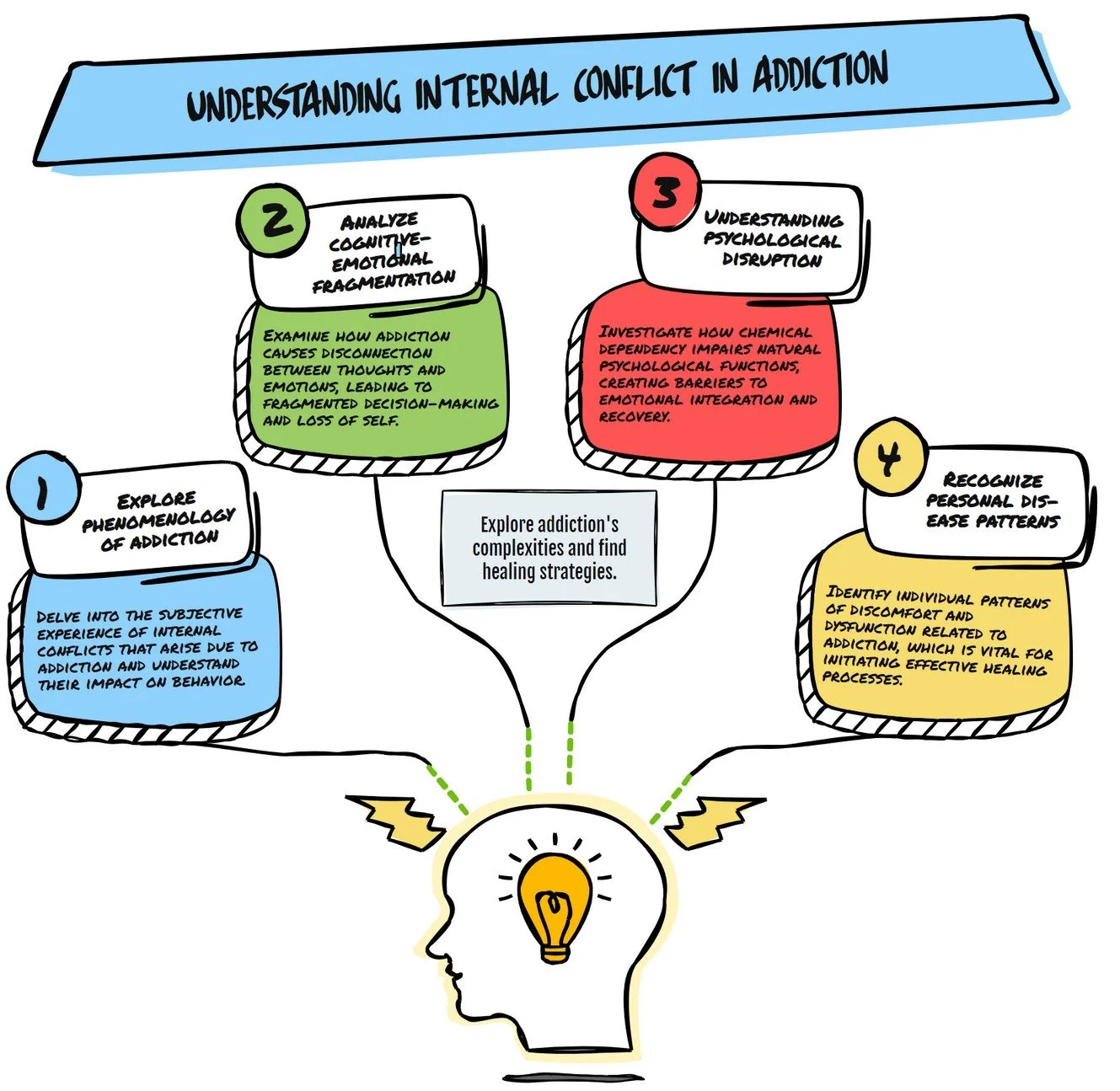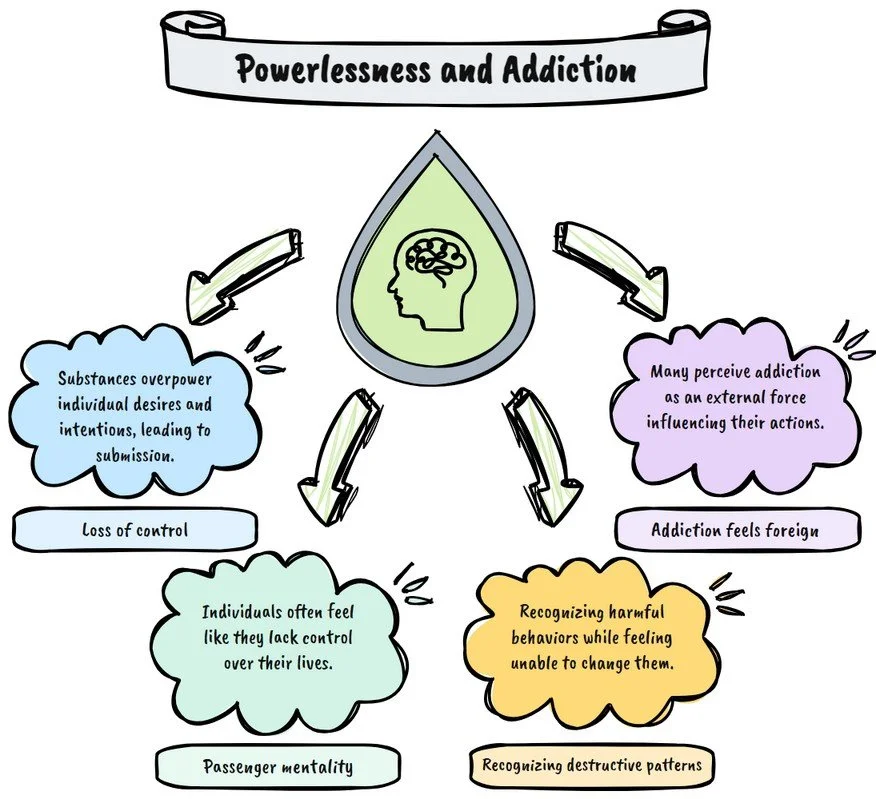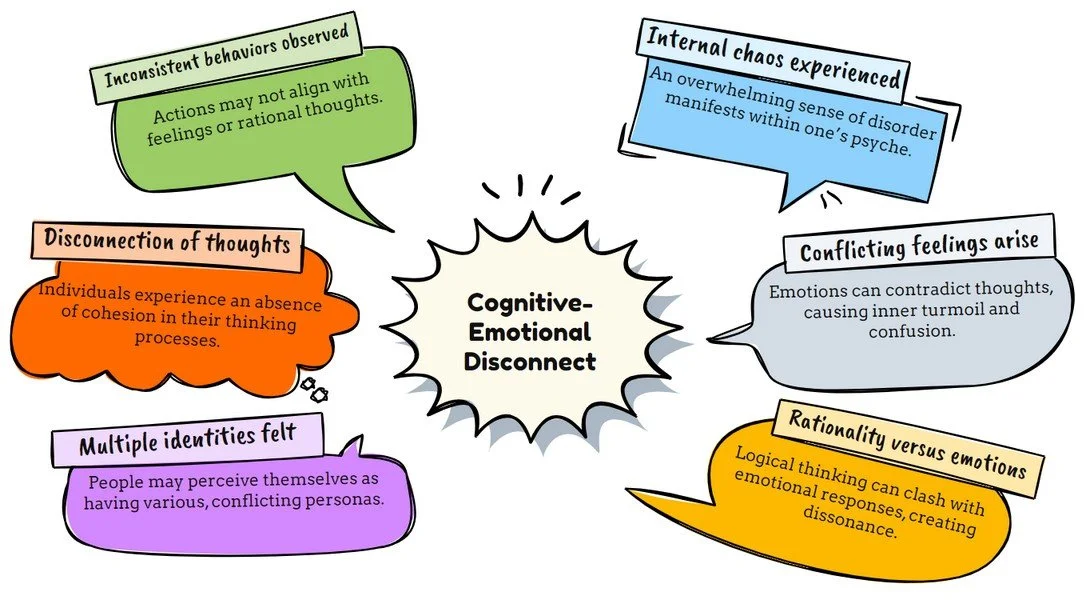
The “Dis-Ease” of Addiction: A Workbook on Internal Conflict and Misalignment
This workbook explores the profound internal discord experienced by individuals struggling with addiction—a state we term "dis-ease." Unlike the clinical disease model that focuses on neurobiological mechanisms, this framework examines the existential and psychological turmoil that characterizes the addictive experience. The “dis-ease” represents a fundamental misalignment between one's authentic self and their lived reality under the influence of addictive substances or behaviors.
At its core, the dis-ease of addiction manifests as an internal conflict involving the fragmentation of thinking, feeling, and behavior. This fragmentation creates a state of profound dissonance where individuals find themselves trapped between their conscious intentions and their compulsive actions, between their core values and their lived behaviors, between their heart's desires and their mind's rationalizations.
The chemical control inherent in addiction perpetuates this dis-ease by hijacking the natural harmony between cognitive processes, emotional responses, and behavioral choices. Individuals experience themselves as divided observing their actions as if from outside themselves, recognizing the destructive patterns while feeling powerless to alter them. This creates a persistent state of internal warfare where the person becomes both the perpetrator and victim of their own suffering. This workbook provides a comprehensive framework for understanding and addressing this dis-ease.
The Magnificent Seven: A Recovery Horror Story
So there I was, thinking that getting sober would be simple. Just put down the bottle, pick up a white chip, and waltz into my new life of serenity and wisdom. What could go wrong? Well, turns out that addiction doesn't just pack up its bags and leave quietly when you ask nicely. Instead, it leaves behind this delightful parting gift I like to call "dis-ease" – and no, that's not a typo, though I wish it were.
First up was Chemical Control and Powerlessness, which basically means discovering that substances had been driving my life like a drunk teenager with the keys to Dad's car. I'd wake up each morning full of resolve, planning my sober day like a military operation, only to find myself mysteriously back at the bar by evening, staring at my drink and wondering who the hell hijacked my brain. My mind would be screaming "STOP!" while my body was already reaching for the next round. It's like being a passenger in your own life, watching some imposter make terrible decisions with your face on.
Then came Cognitive-Emotional-Behavioral Fragmentation, which sounds fancy but basically means my head, heart, and actions were having a three-way argument that no one was winning. My brain would logically explain why sobriety was the only sensible choice, my emotions would sob about how impossible life felt without chemical assistance, and my behavior would split the difference by doing something completely random that satisfied neither. I felt like a committee of personalities trying to run a one-person show, with about as much coordination as you'd expect.
Values-Behavior Misalignment was particularly fun – imagine claiming to value honesty while lying through your teeth daily, or professing love for your family while systematically destroying every relationship that mattered. It's like being a vegetarian who works at a slaughterhouse and wonders why dinner feels complicated. The gap between who I claimed to be and who I actually was became so wide you could drive a truck through it. Or in my case, a very expensive habit that rendered all my stated principles completely meaningless.
Head-Heart Division turned me into my own worst enemy in a never-ending internal debate. My rational mind would present compelling evidence for sobriety – charts, graphs, the occasional intervention from concerned loved ones – while my emotional self would respond with the intellectual equivalent of sticking its fingers in its ears and humming loudly. It was like having a very smart person and a very dramatic person forced to share the same brain, and they absolutely hated each other's guts.
Internal Warfare and Self-Conflict escalated things to the point where I felt like Switzerland had declared war on itself. Different parts of me wanted completely opposite things, and they were all fighting so loudly I couldn't hear myself think. The recovery part would make detailed plans and goals, the using part would sabotage them creatively, and the critic part would stand on the sidelines providing color commentary on what a disaster the whole show was. Exhausting doesn't begin to cover it.
Authenticity Loss was perhaps the most existentially terrifying – realizing I had no idea who I actually was underneath all the layers of addiction, adaptation, and performance. I'd been playing so many different roles for so long that when someone asked about my genuine interests or preferences, I'd panic like an actor who'd forgotten all their lines. Who was I when I wasn't using? Who was I when I wasn't performing recovery? Who was I when I wasn't desperately trying to be whoever I thought others wanted me to be? The silence where my authentic self should have been was deafening.
Finally, Shame and Self-Recrimination tied it all together with a nice toxic bow. This was the voice that took every struggle, every setback, every moment of confusion or difficulty, and translated it into evidence of my fundamental defectiveness as a human being. Other people could recover normally, but I was clearly broken beyond repair. Other people had willpower, but I was weak. Other people deserved compassion, but I deserved whatever punishment my harsh inner critic could devise. Shame was like having a very creative prosecutor living in my head rent-free, building case files on all the ways I was inadequate.
The darkly hilarious part about all this dis-ease was that it made recovery feel like trying to solve a Rubik's cube while riding a unicycle in an earthquake. Just when I'd get one dimension somewhat stable, three others would explode into chaos. It was like playing emotional whack-a-mole with issues that had the persistence of telemarketers and the subtlety of a freight train.
But here's the thing that nobody tells you in those cheerful recovery pamphlets: recognizing this dis-ease is actually the beginning of real healing, not evidence that you're doing recovery wrong. Learning to names these experiences – to say "Oh, hello Chemical Control, I see you're back" or "Ah, Internal Warfare, right on schedule" – transforms them from mysterious suffering into workable challenges. It's still hard, but it's hard like learning to play piano rather than hard like being trapped in a horror movie with no exit signs.
The real plot twist came when I realized that the goal wasn't to eliminate all these experiences but to develop a different relationship with them. Instead of being terrified of head-heart division, I could get curious about what each side was trying to tell me. Instead of drowning in shame, I could practice the radical concept of treating myself like a human being who deserved basic decency. Instead of fighting internal warfare, I could try internal diplomacy. Revolutionary stuff, really.
Recovery isn't about becoming someone who never experiences dis-ease – it's about becoming someone who can experience dis-ease without immediately reaching for a substance to make it stop. It's learning to sit with discomfort like an adult rather than a toddler having a meltdown in the cereal aisle. And occasionally, just occasionally, you might even find moments of actual ease hidden between all the dis-ease, like finding a twenty-dollar bill in an old jacket pocket. Those moments remind you why this whole recovery thing might actually be worth the price of admission after all.






